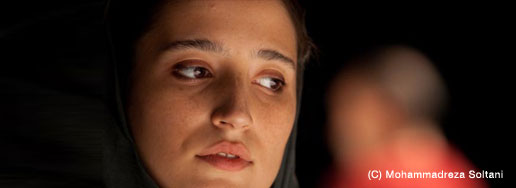Where were you on January 8th?
Mehr Theatre Group [Iran]

Performing Arts Festival launching from Tokyo
Iranian playwright and direct Amir Reza Koohestani previously participated in F/T09 Spring in the Japanese-French-Iranian international collaboration, "Utopia?", which looked ironically "backstage" at an exchange between alien cultures. "Where Were You On January 8th?" was first performed in Tehran in December 2009 and examines the June 2009 Iranian presidential elections. This stylishly designed production uncovers the taboos latent in contemporary Iranian society through dialogue sprinkled with metaphors. Since its debut in Iran it has already been performed in 6 countries worldwide and now arrives in Tokyo.
The opposition movement that arose in Tehran following the June 2009 presidential election met with violent oppression. Amir Reza Koohestani was studying in the UK at the time and learnt of the events from afar. Upon returning home he had to find out the truth about what happened through searching amongst the aftermath in the city. The result of his quest is this play. 6 men and women talk to each other over the phone, linked by mutual mistrust and suspicions about a previous incident. In their dialogue and the fragments of happenings, we see a portrait of Iranian society and its suppressed truths. Somewhere between symbolism and realism, wriggling through the net of state censorship, Koohestaniʼs work projects the life of his society like a mirror for the audience to witness.
The playʼs premise emerges from one snowy night on the outskirts of Tehran on January 8.
4 young women are rehearsing Jean Genetʼs "The Maids". Joining them is Ali, the fiancé of one of the actresses, Fatima, and who is doing his military service in the police. He is not supposed to be there but Fatima insisted. Defying the law that forbids a soldier to carry a weapon in a private place, he had promised the Duty Officer to return to the police station before dawn. The snow stopped him. Abdi also joined the rehearsal and they are forced to spend the night in the house.
The next day, when Ali wakes up, he is alone and his weapon has disappeared.
But the house is not the setting for the plot, nor the weapon the real issue. Rather the play weaves a series of phone conversations after that night, implicitly evoking through the dialogue the current situation of young people in Iran today seeking ways to be heard.